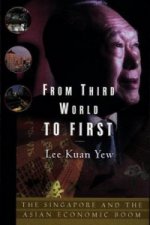
Kód: 04935546
Cold War and Decolonization in Guinea, 1946-1958
Autor Elizabeth Schmidt
In September 1958, Guinea claimed its independence, rejecting a constitution that would have relegated it to junior partnership in the French Community. In all the French empire, Guinea was the only territory to vote "No." Orchest ... celý popis
- Jazyk:
 Angličtina
Angličtina - Vazba: Brožovaná
- Počet stran: 320
Nakladatelství: Ohio University Press, 2007
- Více informací o knize

Mohlo by se vám také líbit
-

Time: A User's Guide
494 Kč
Darujte tuto knihu ještě dnes
- Objednejte knihu a zvolte Zaslat jako dárek.
- Obratem obdržíte darovací poukaz na knihu, který můžete ihned předat obdarovanému.
- Knihu zašleme na adresu obdarovaného, o nic se nestaráte.
Více informací o knize Cold War and Decolonization in Guinea, 1946-1958
Nákupem získáte 103 bodů
 Anotace knihy
Anotace knihy
In September 1958, Guinea claimed its independence, rejecting a constitution that would have relegated it to junior partnership in the French Community. In all the French empire, Guinea was the only territory to vote "No." Orchestrating the "No" vote was the Guinean branch of the Rassemblement Democratique Africain (RDA), an alliance of political parties with affiliates in French West and Equatorial Africa and the United Nations trusts of Togo and Cameroon. Although Guinea's stance vis-a-vis the 1958 constitution has been recognized as unique, until now the historical roots of this phenomenon have not been adequately explained. Clearly written and free of jargon, "Cold War and Decolonization in Guinea" argues that Guinea's vote for independence was the culmination of a decade-long struggle between local militants and political leaders for control of the political agenda. Since 1950, when RDA representatives in the French parliament severed their ties to the French Communist Party, conservative elements had dominated the RDA. In Guinea, local cadres had opposed the break. Victimized by the administration and sidelined by their own leaders, they quietly rebuilt the party from the base. Leftist militants, their voices muted throughout most of the decade, gained preeminence in 1958, when trade unionists, students, the party's women's and youth wings, and other grassroots actors pushed the Guinean RDA to endorse a "No" vote. Thus, Guinea's rejection of the proposed constitution in favor of immediate independence was not an isolated aberration. Rather, it was the outcome of years of political mobilization by activists who, despite Cold War repression, ultimately pushed the Guinean RDA to the left. The significance of this highly original book, based on previously unexamined archival records and oral interviews with grassroots activists, extends far beyond its primary subject. In illuminating the Guinean case, Elizabeth Schmidt helps us understand the dynamics of decolonization and its legacy for postindependence nation-building in many parts of the developing world. Examining Guinean history from the bottom up, Schmidt considers local politics within the larger context of the Cold War, making her book suitable for courses in African history and politics, diplomatic history, and Cold War history.
 Parametry knihy
Parametry knihy
Zařazení knihy Knihy v angličtině Humanities History History: earliest times to present day
1027 Kč
- Plný název: Cold War and Decolonization in Guinea, 1946-1958
- Autor: Elizabeth Schmidt
- Jazyk:
 Angličtina
Angličtina - Vazba: Brožovaná
- Počet stran: 320
- EAN: 9780821417645
- ISBN: 0821417649
- ID: 04935546
- Nakladatelství: Ohio University Press
- Hmotnost: 471 g
- Rozměry: 229 × 152 × 20 mm
- Datum vydání: 25. September 2007
Oblíbené z jiného soudku
-

The Origins of Totalitarianism
276 Kč -

From Third World to First
357 Kč -

Illustrated Encyclopedia of Uniforms of World War I
543 Kč -

Peloponnesian War
330 Kč -

Anunnaki Homeworld
425 Kč -

Medieval Dagger
681 Kč -

Love and War in the Apennines
312 Kč -

Nostradamus and the Planets of Apocalypse
366 Kč -

Byzantium and the Rise of Russia
921 Kč -

Eleni
343 Kč -

On Tyranny
276 Kč -

Meditations
214 Kč -

Histories
146 Kč -

Guns, Germs, and Steel
284 Kč -

Rise and Fall of Ancient Egypt
464 Kč -

Chickenhawk
303 Kč -

Swerve
269 Kč -

Distant Mirror
357 Kč -

Lives of the Caesars
288 Kč -

Making Medieval Manuscripts
507 Kč -

Oxford History of Poland-Lithuania
1709 Kč -

Postwar
462 Kč -

Tuesdays With Morrie
276 Kč -

Underground
306 Kč -

End of Days
195 Kč -

King Leopold's Ghost
303 Kč -

Complete Roman Army
543 Kč -

Age Of Capital
410 Kč -

Travels of Ibn Battutah
303 Kč -

Creation of Patriarchy
651 Kč -

Age Of Extremes
462 Kč -

John Skylitzes: A Synopsis of Byzantine History, 811-1057
972 Kč -

America's Secret Establishment
400 Kč -

Key of Solomon the King (Clavicula Salomonis)
278 Kč -

King's Two Bodies
679 Kč -

On Ancient Warfare
1017 Kč -

Medieval Europe
366 Kč -

Caligula
90 Kč -

De Re Militari (Concerning Military Affairs)
401 Kč -

1913
306 Kč -

Ravenna
424 Kč -

Aquariums of Pyongyang
303 Kč -

Truman
488 Kč -

Medusa
524 Kč -

Eros and Magic in the Renaissance
1025 Kč -

Chernobyl Prayer
276 Kč -

History of the Ancient World
765 Kč -

Who Paid The Piper?
358 Kč -

Thank You for Being Late
358 Kč
Osobní odběr Praha, Brno a 12903 dalších
Copyright ©2008-24 nejlevnejsi-knihy.cz Všechna práva vyhrazenaSoukromíCookies



 Vrácení do měsíce
Vrácení do měsíce 571 999 099 (8-15.30h)
571 999 099 (8-15.30h)